Submitted:
25 January 2023
Posted:
26 January 2023
You are already at the latest version
Abstract
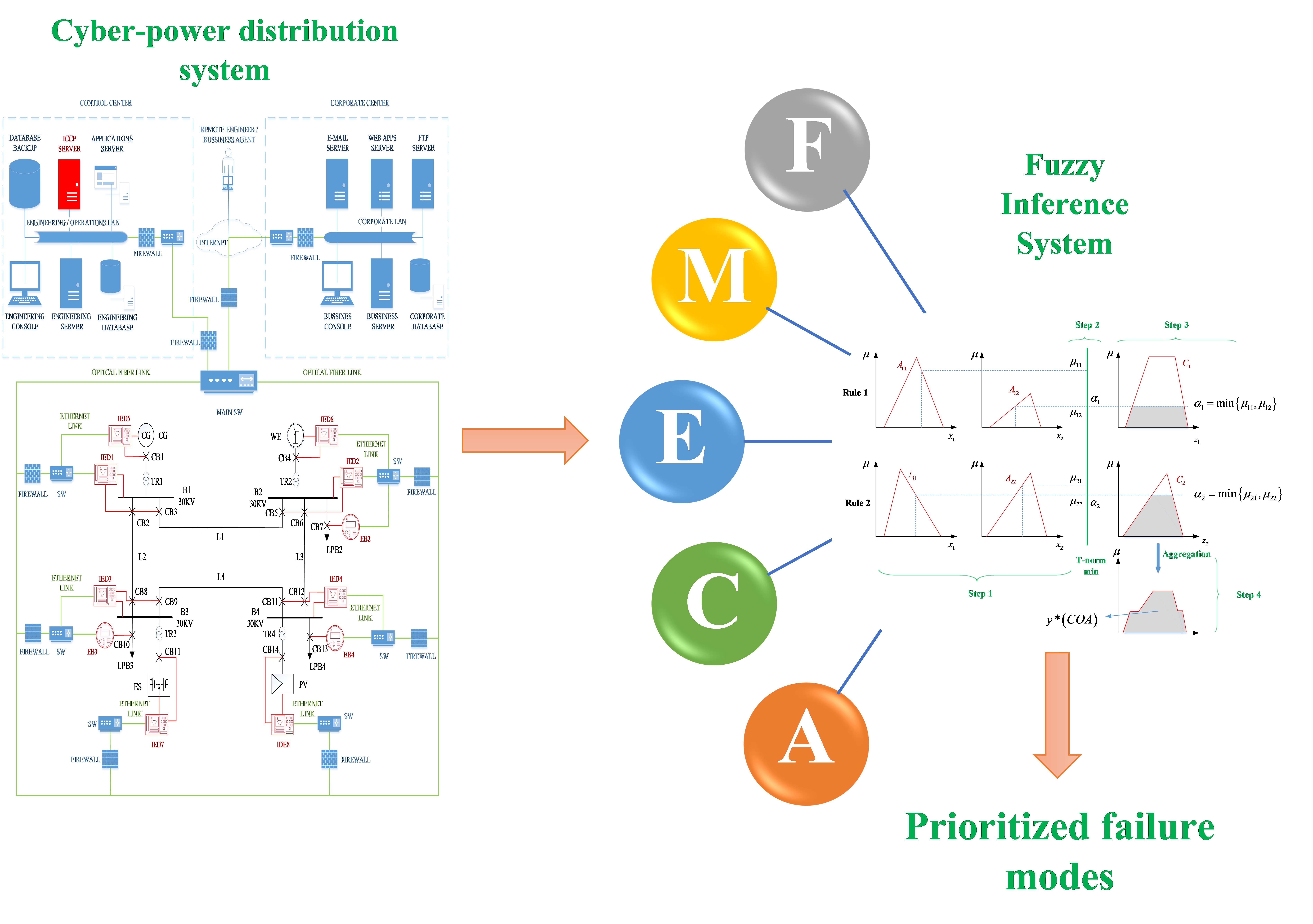
Keywords:
1. Introduction
- The computation of RPN does not take into account the relative importance of Severity, Occurrence, and Detection;
- Different combinations of S, O, and D can produce the same RPN;
- The numerical scales used to represent risk factors are usually attributed and are essentially qualitative scales;
- The assessment of risk factors is subjective, and;
- Although risk factors are represented as intervals, the risk computing method is inappropriate for this kind of data.
2. Literature Review
3. Type-I Fuzzy Inference Systems
3.1. Fuzzy Sets and Fuzzy Logic
3.2. Fuzzy Membership Functions
3.3. Fuzzy If-Then Rules
3.4. Fuzzy Inference Systems
- The input processing stage is called fuzzification, where the input variables are transformed into fuzzy sets;
- The reasoning mechanism, which performs the inference procedure based on the pre-defined fuzzy rules and the selected fuzzy inference mechanism, to derive a reasonable output or conclusion; and,
- In the output processing stage, defuzzification transforms the fuzzy sets resulting from the reasoning mechanism into a crisp value.
- Step 1: Obtain the membership value for each input variable in the antecedent part of the fuzzy rule. In the example of Figure 3, for Rule 1, the membership value for the input in the fuzzy set is , and the membership value for the input variable in the fuzzy set is . The same analysis is valid for rule 2;
- Step 2: Combine the membership values on the antecedent part of each rule through a specific fuzzy operator, usually the min(∙) operator or the max(∙) operator, to get a fuzzy rule’s weight (called firing strength); this step is equivalent to use the AND operator or the OR operator in Boolean logic. If the result of the combination is greater than zero, the rule is “fired,” and its consequent will be computed using this firing strength. In the example of Figure 3, the operator min(∙), equivalent to the Boolean operator AND, is used to obtain the minimal value between and , resulting in the rule 1 firing strength . The same analysis is valid for rule 2;
- Step 3: Generate the qualified consequents of each rule by weighting each consequent fuzzy set with the firing strength obtained in step 2. This step is equivalent to the implication (THEN) in Boolean logic. In the example of Figure 3, the fuzzy output rule 1 is weighted by the firing strength . The implication operator, usually the min operator, truncates the consequent’s fuzzy set at the value, obtaining the shaded area in set C1. The same analysis is valid for rule 2.
- Step 4: Aggregate all the qualified consequents to produce the FIS fuzzy output, then this output is defuzzified to obtain the final crisp output. The aggregation process combines all rule’s consequents to obtain a single fuzzy set through an aggregation operator, usually the operator max(∙). Defuzzification is the process of extracting a crisp representative value from a fuzzy set. This work considers the centroid of the area, COA, because it is the most popular defuzzification method [30]. In the example of Figure 3, the application of the operator max(∙) between the rule’s outputs produces the shaded area, and the application of the operator COA produces the FIS crisp output .
3.5. FMECA Risk Factors Expressed in Fuzzy Terms
- The severity categories are as follows: Severity minor (SMI), severity low (SL), severity moderate (SM), severity very high (SVH), and severity hazardous (SH);
- The term-set for Severity is: ;
- The semantic rule for the term set for Severity is shown in Table 1:
| Semantic rule | Fuzzy subset |
|---|---|
| The effect of the failure mode is considered minor when assessed as 1 | |
| The effect of the failure mode is considered as low when assessed between 2 and 3 | |
| The effect of the failure mode is considered moderate when assessed between 4 to 6 | |
| The effect of the failure mode is considered very high when assessed between 7 to 8 | |
| The effect of the failure mode is considered hazardous when assessed between 9 to 10 |
- Regarding the occurrence, we consider the following assumptions:
- The occurrence categories are the following: Occurrence remote (OR), occurrence very unlikely (OVU), occurrence occasional (OO), occurrence probable (OR), and occurrence frequent (OF);
- The term-set for O is: ;
- The semantic rule for are:
| Semantic rule | Fuzzy subset |
|---|---|
| The occurrence of the failure mode is considered remote when assessed as 1 | |
| The occurrence of the failure mode is considered very unlikely when assessed between 2 and 3 | |
| The occurrence of the failure mode is considered occasional when assessed between 4 to 6 | |
| The occurrence of the failure mode is considered probable when assessed between 7 to 8 | |
| The occurrence of the failure mode is considered frequent when assessed between 9 to 10 |
- The categories for detection are as follows: Detection almost certain (DAC), detection high (DH), detection moderate (DM), detection low (DL), and detection absolutely impossible (DAI);
- The term-set for D is: ;
- The semantic rule for are:
| Semantic rule | Fuzzy subset |
|---|---|
| The detection of the failure mode is considered almost certain when assessed as 1 | |
| The detection of the failure mode is considered as high when assessed between 2 and 3 | |
| The detection of the failure mode is considered moderate when assessed between 4 to 6 | |
| The detection of the failure mode is considered as low when assessed between 7 to 8 | |
| The detection of the failure mode is considered absolutely impossible when assessed between 9 to 10 |
- The categories for the RPN were defined as follows: Risk minor (RMI), risk low (RL), risk moderate (RM), risk high (RH), and risk extreme (RE);
- The term-set for RPN is: ;
- The semantic rule for are:
| Semantic rule | Fuzzy subset |
|---|---|
| The overall risk of the failure mode is considered minor when assessed around 1 | |
| The overall risk of the failure mode is considered as low when assessed between 2 and 3 | |
| The overall risk of the failure mode is considered moderate when assessed between 4 and 6 | |
| The overall risk of the failure mode is considered very high when assessed between 7 to 8 | |
| The overall risk of the failure mode is considered hazardous when assessed between 9 to 10 |
4. Implementation
- Stage 1: The classical FMECA is conducted; as a result, we obtain the value of the three risk factors for each failure mode and its respective ranking. The steps corresponding to these stages are shown in blue in Figure 4;
- Stage 2: This stage comprises the fuzzy-based FMECA, and their respective steps are shown in orange in Figure 4. The fuzzy database (composed of the fuzzy sets) and the fuzzy rules are constructed considering the expert criteria of the FMECA team members; using the information of the fuzzy database, the risk factors (S, O, D and RPN) are fuzzified. The fuzzy risk factors and the fuzzy rules are the input for the fuzzy inference mechanism; once the inference mechanism is executed, the fuzzy RPN and the failure mode’s ranking are obtained;
4.1. Fuzzy Categories for the FMECA Risk Factors
4.2. Membership Functions for the FMECA Risk Factors
| Severity | Occurrence | Detection | FRPN1 | Rating |
|---|---|---|---|---|
| Hazardous – SHA | Frequent – OF | Absolutely impossible – DAI | Extreme – RE | 9,10 |
| Very High – SVH | Probable – OP | Low – DL | High – RH | 7,8 |
| Moderate – SM | Occasional – OO | Moderate – DM | Moderate – RM | 4,5,6 |
| Low – SL | Very unlikely – OVU | High – DH | Low – RL | 2,3 |
| Minor – SMI | Remote – OR | Almost certain – DAC | Minor – RMI | 1 |
- Most of the functions’ shapes are non-symmetrical to allow different overlapping levels between categories.
- The triangular membership function SMI has the lower limit at S = 0 and the upper limit at S = 2.5; the maximum membership value occurs at S = 1.5.
- The triangular membership function SL has the lower limit at S = 0.6 and the upper limit at S = 3.5; the maximum membership value occurs at S = 2.5, that is, at the mid-point of its respective interval.
- Categories SMI and SL are superposed. When a failure mode’s severity is rated as 1, we can say that it belongs to category SMI with membership 0.667 and, simultaneously, to category SL with membership 0.285. When a failure mode’s severity is rated as 2, we can say that it belongs to category SL with a membership of 0.70, and at the same time, it belongs to category SM with a membership of 0.50. The simultaneous membership of a particular failure mode into two different categories shows the flexibility of the system to represent the vagueness associated with the risk perception of the members of the FMECA team.
- The membership functions for occurrence, detection, and fuzzy RPN were parametrized following the abovementioned criteria.
- Most of the functions are shaped as non-symmetrical to allow different overlapping levels between categories.
- The trapezoidal membership function SMI has the lower limit at S = 0 and the upper limit at S = 2.4; the maximum membership value occurs between S = 1 and S=1.5.
- The trapezoidal membership function SL has the lower limit at S = 0.9 and the upper limit at S = 3.5; the maximum membership value occurs between S = 2 and S = 3.
- Categories SMI and SL are superposed. When a failure mode’s severity is rated as 1, we can say that it belongs to category SMI with the maximum membership of 1.0 and, at the same time, it belongs to category SL with a membership of 0.09. When a failure mode’s severity is rated as 2, we can say that it belongs to category SM with the maximum membership of 1.0 and, at the same time, it belongs to category SL with a membership of 0.44.
- The membership functions for occurrence and detection were parametrized following the criteria mentioned above and considered full membership for the range that defines each category, except for the fuzzy RPN.
4.3. Fuzzy If-Then Rules for the Proposed Approach
4.4. Operations for the type-I fuzzy inference system
- And method – min;
- Implication method – min;
- Aggregation method – max;
- Defuzzification – centroid of the area;
5. Application of the Fuzzy-FMECA Approach to Cyber-Power Grid
5.1. Cyber-Power Grid Test System
5.2. Membership Functions for the FIS Implemented
6. Results and Discussion
6.1. Higher Differences in Prioritization for the Riskiest Failure Modes
- Rule 88: If (sev is SVH) and (occ is OO) and (det is DM,) then (RPN is RH)
- Rule 89: If (sev is SVH) and (occ is OO) and (det is DL), then (RPN is RH)
- Rule 93: If (sev is SVH) and (occ is OP) and (det is DM), then (RPN is RH)
- Rule 94: If (sev is SVH) and (occ is OP) and (det is DL), then (RPN is RH)
- Rule 113: If (sev is SHA) and (occ is OO) and (det is DM), then (RPN is RH)
- Rule 114: If (sev is SHA) and (occ is OO) and (det is DL), then (RPN is RH)
- Rule 118: If (sev is SHA) and (occ is OP) and (det is DM), then (RPN is RH)
- Rule 119: If (sev is SHA) and (occ is OP) and (det is DL), then (RPN is RE)
6.2. Failure Modes with the Same FRPN
- Rule 59: If (sev is SM) and (occ is OVU) and (det is DL), then (RPN is RM)
- Rule 60: If (sev is SM) and (occ is OVU) and (det is DAI), then (RPN is RH)
- Rule 84: If (sev is SVH) and (occ is OVU) and (det is DL), then (RPN is RH)
- Rule 85: If (sev is SVH) and (occ is OVU) and (det is DAI), then (RPN is RH)
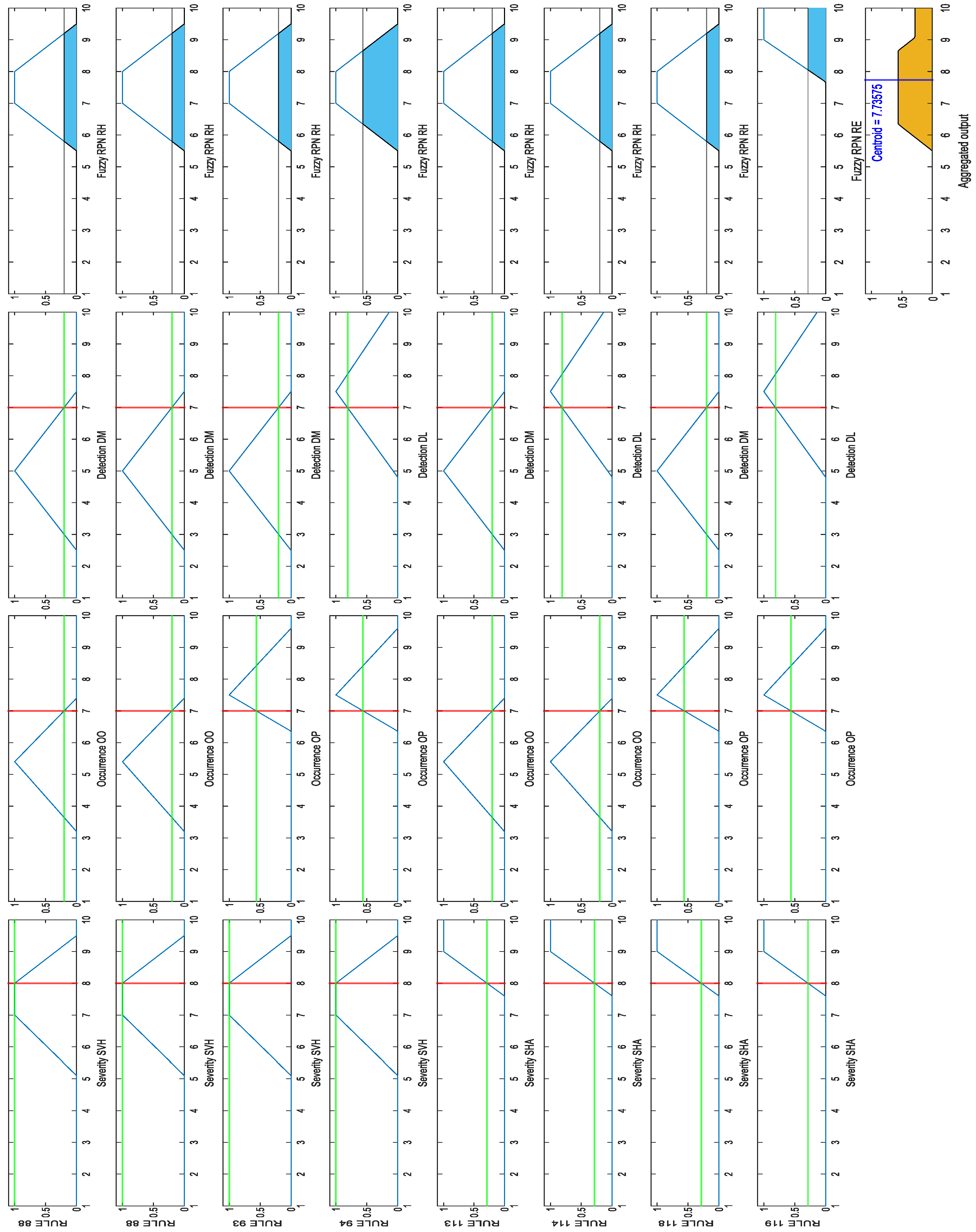
- Rule 59: If (sev is SM) and (occ is OVU) and (det is DL), then (RPN is RM)
- Rule 60: If (sev is SM) and (occ is OVU) and (det is DAI), then (RPN is RH)
- Establish individual categories for the risk factors rankings, that is, ten categories instead of 5;
- Modify the overlapping between fuzzy categories and;
- Modify the membership function parameters or use non-linear membership functions.
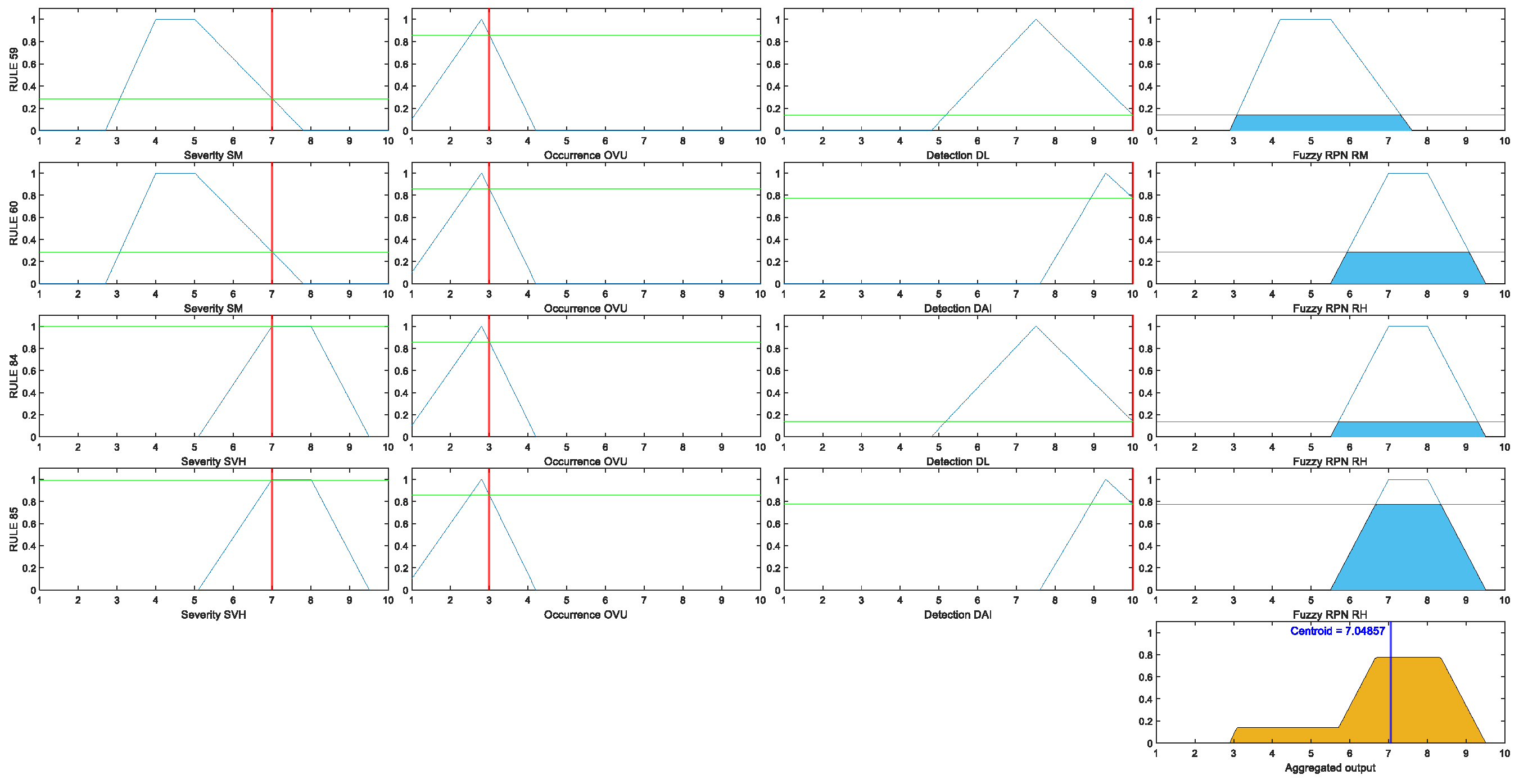
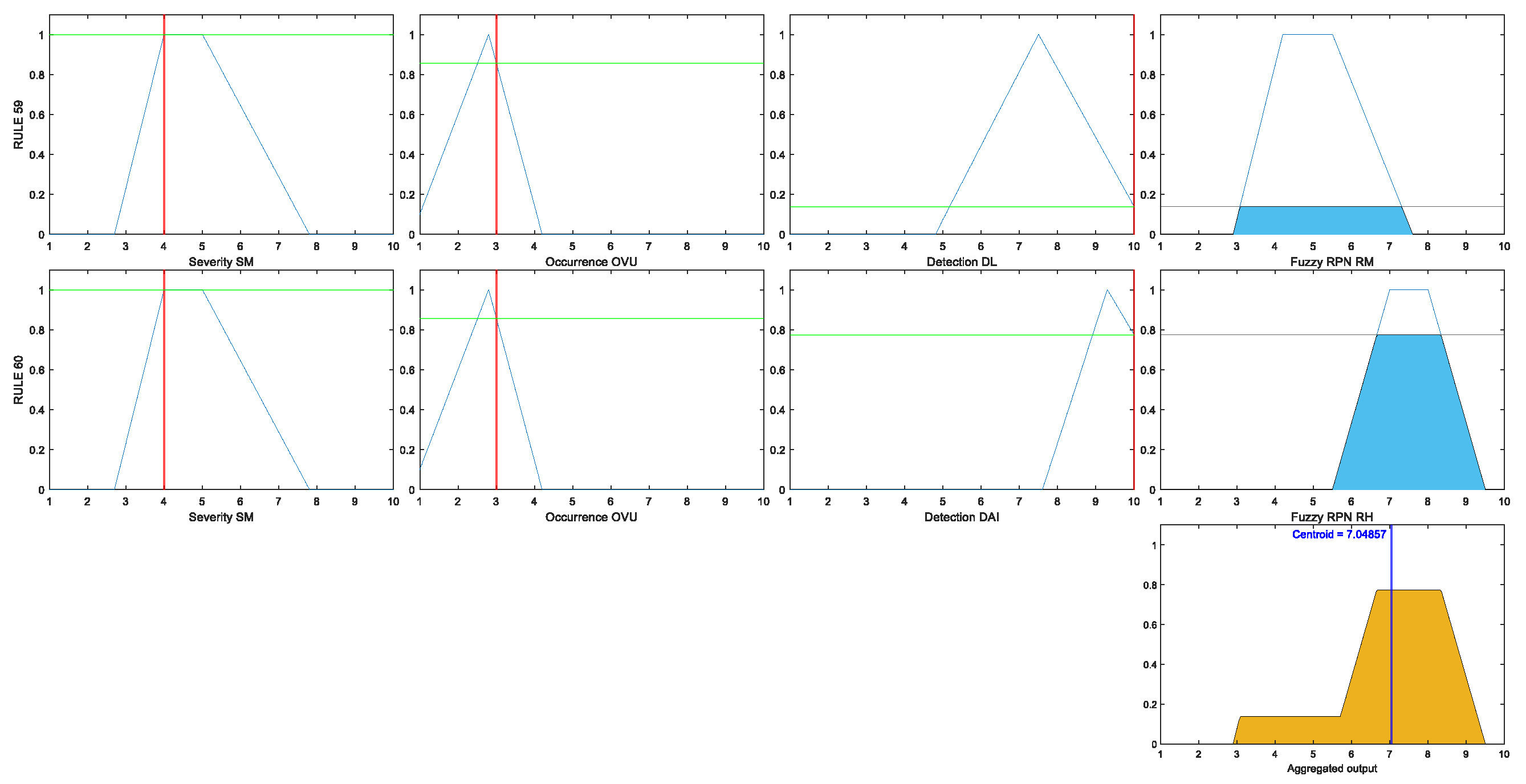
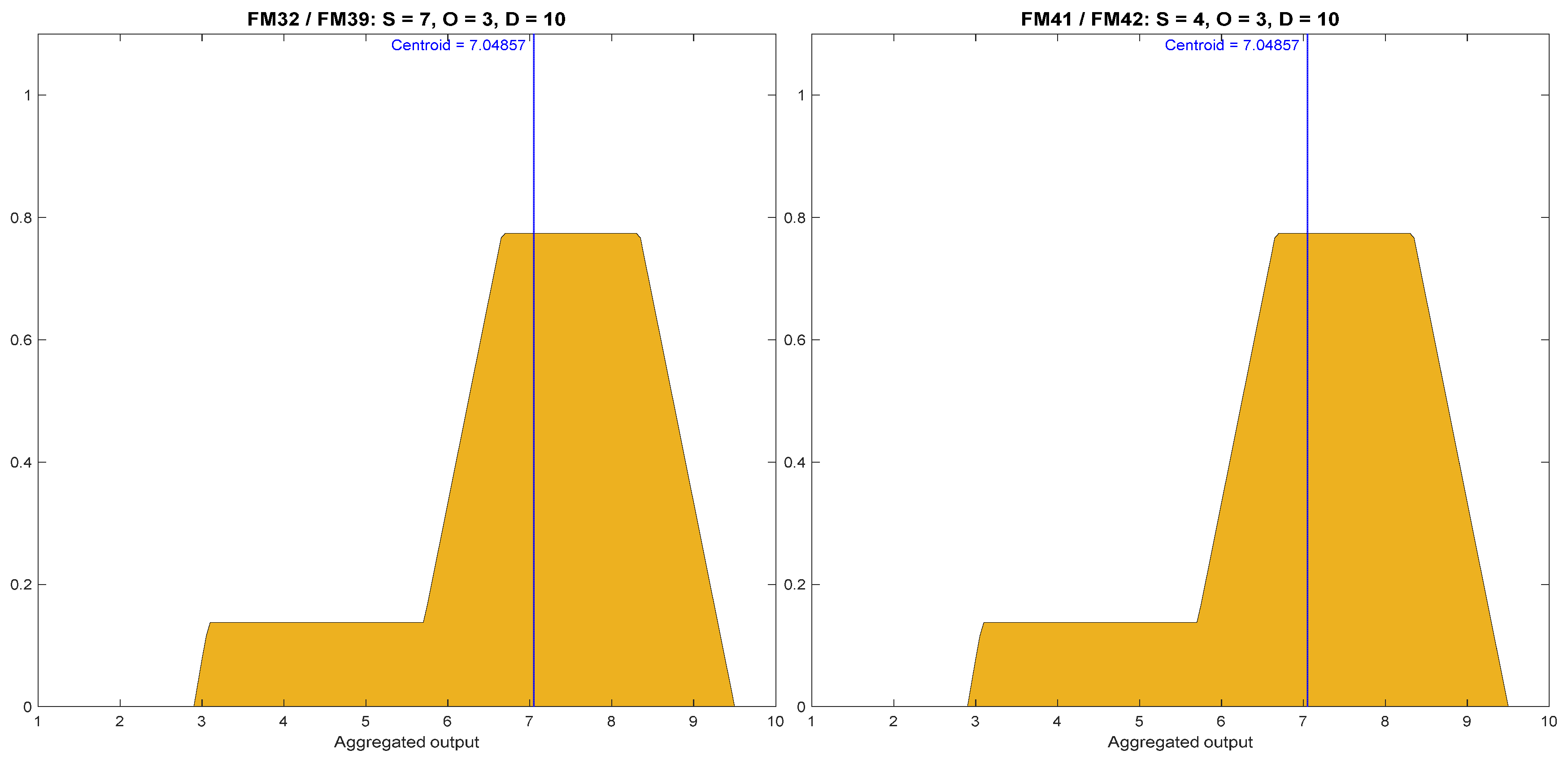
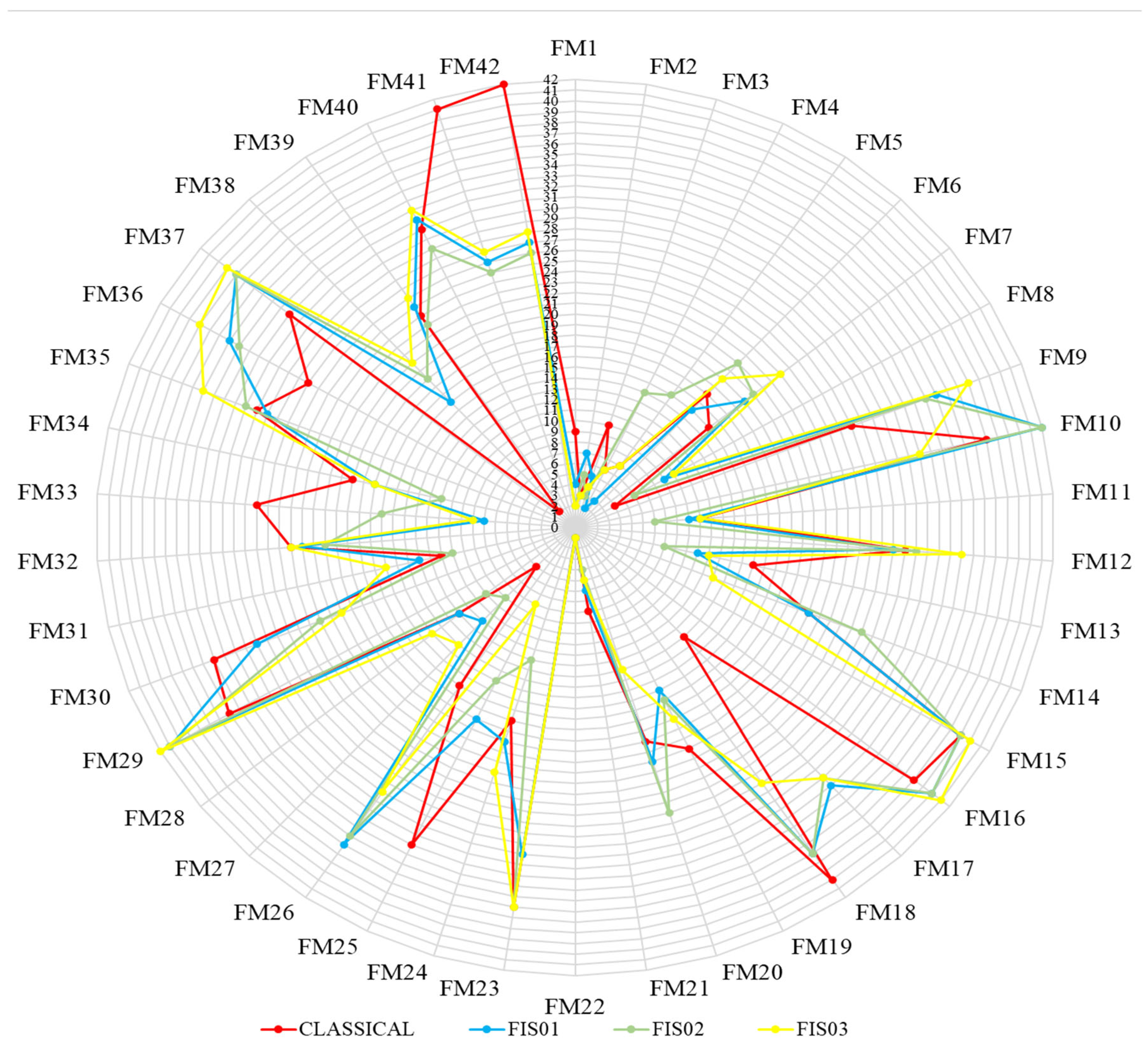
7. Conclusions
- 1.
- The use of fuzzy sets allows us to represent the uncertainty related to the expert knowledge of the FMECA team members, sometimes represented by the boundary sharpness and overlapping between risk categories;
- 1.
- The fuzzy rules are useful to represent, in the form of “if-then” rules, the risk perception of the FMECA team members;
- 2.
- According to the selection of the fuzzy sets and fuzzy rules, some failure modes can produce the same FRPN value;
- 3.
- The difference in ranking obtained from the classical and the fuzzy-based FMECA depends on the defined fuzzy consequent and the rule’s firing strength;
- 4.
- The fuzzy-based FMECA considered a different level of importance for the risk factors. In this way, failure modes previously ranked as the riskiest by classical FMECA were relocated to a most correct priority;
- 5.
- The fuzzy systems do not have a rigid configuration and must be adapted for each problem and environment. Once the parameters of the fuzzy sets and rules capture the criteria of the FMECA team member, the fuzzy-based FMECA becomes a powerful tool for the failure modes evaluation.
- Definition of tailor-made risk categories and scales for the FMECA risk factors in the context of cyber-power grids;
- The use of ten risk categories to represent the risk factors;
- A sensibility analysis of the overlapping between the membership functions;
- The use of non-linear membership functions;
- The application of Type-II Fuzzy Inference Systems for the fuzzy-based FMECA analysis in cyber-power grids;
- The proposal for a statistical-based comparison method for different FMECA approaches.
Author Contributions
Funding
Conflicts of Interest
Appendix A
- If (sev is SMI) and (occ is OR) and (det is DAC), then (RPN is RMI)
- If (sev is SMI) and (occ is OR) and (det is DH), then (RPN is RMI)
- If (sev is SMI) and (occ is OR) and (det is DM,) then (RPN is RL)
- If (sev is SMI) and (occ is OR) and (det is DL), then (RPN is RL)
- If (sev is SMI) and (occ is OR) and (det is DAI,) then (RPN is RM)
- If (sev is SMI) and (occ is OVU) and (det is DAC), then (RPN is RMI)
- If (sev is SMI) and (occ is OVU) and (det is DH), then (RPN is RMI)
- If (sev is SMI) and (occ is OVU) and (det is DM), then (RPN is RL)
- If (sev is SMI) and (occ is OVU) and (det is DL), then (RPN is RL)
- If (sev is SMI) and (occ is OVU) and (det is DAI), then (RPN is RM)
- If (sev is SMI) and (occ is OO) and (det is DAC), then (RPN is RMI)
- If (sev is SMI) and (occ is OO) and (det is DH), then (RPN is RL)
- If (sev is SMI) and (occ is OO) and (det is DM), then (RPN is RL)
- If (sev is SMI) and (occ is OO) and (det is DL), then (RPN is RM)
- If (sev is SMI) and (occ is OO) and (det is DAI), then (RPN is RH)
- If (sev is SMI) and (occ is OP) and (det is DAC), then (RPN is RMI)
- If (sev is SMI) and (occ is OP) and (det is DH), then (RPN is RL)
- If (sev is SMI) and (occ is OP) and (det is DM), then (RPN is RL)
- If (sev is SMI) and (occ is OP) and (det is DL), then (RPN is RM)
- If (sev is SMI) and (occ is OP) and (det is DAI), then (RPN is RH)
- If (sev is SMI) and (occ is OF) and (det is DAC), then (RPN is RL)
- If (sev is SMI) and (occ is OF) and (det is DH), then (RPN is RL)
- If (sev is SMI) and (occ is OF) and (det is DM), then (RPN is RM)
- If (sev is SMI) and (occ is OF) and (det is DL), then (RPN is RH)
- If (sev is SMI) and (occ is OF) and (det is DAI), then (RPN is RH)
- If (sev is SL) and (occ is OR) and (det is DAC), then (RPN is RMI)
- If (sev is SL) and (occ is OR) and (det is DH), then (RPN is RMI)
- If (sev is SL) and (occ is OR) and (det is DM), then (RPN is RL)
- If (sev is SL) and (occ is OR) and (det is DL), then (RPN is RL)
- If (sev is SL) and (occ is OR) and (det is DAI), then (RPN is RM)
- If (sev is SL) and (occ is OVU) and (det is DAC), then (RPN is RMI)
- If (sev is SL) and (occ is OVU) and (det is DH), then (RPN is RL)
- If (sev is SL) and (occ is OVU) and (det is DM), then (RPN is RL)
- If (sev is SL) and (occ is OVU) and (det is DL), then (RPN is RM)
- If (sev is SL) and (occ is OVU) and (det is DAI), then (RPN is RH)
- If (sev is SL) and (occ is OO) and (det is DAC), then (RPN is RMI)
- If (sev is SL) and (occ is OO) and (det is DH), then (RPN is RL)
- If (sev is SL) and (occ is OO) and (det is DM), then (RPN is RL)
- If (sev is SL) and (occ is OO) and (det is DL), then (RPN is RM)
- If (sev is SL) and (occ is OO) and (det is DAI), then (RPN is RH)
- If (sev is SL) and (occ is OP) and (det is DAC), then (RPN is RL)
- If (sev is SL) and (occ is OP) and (det is DH), then (RPN is RL)
- If (sev is SL) and (occ is OP) and (det is DM), then (RPN is RM)
- If (sev is SL) and (occ is OP) and (det is DL), then (RPN is RH)
- If (sev is SL) and (occ is OP) and (det is DAI), then (RPN is RH)
- If (sev is SL) and (occ is OF) and (det is DAC), then (RPN is RL)
- If (sev is SL) and (occ is OF) and (det is DH), then (RPN is RM)
- If (sev is SL) and (occ is OF) and (det is DM), then (RPN is RH)
- If (sev is SL) and (occ is OF) and (det is DL), then (RPN is RH)
- If (sev is SL) and (occ is OF) and (det is DAI), then (RPN is RE)
- If (sev is SM) and (occ is OR) and (det is DAC), then (RPN is RMI)
- If (sev is SM) and (occ is OR) and (det is DH), then (RPN is RL)
- If (sev is SM) and (occ is OR) and (det is DM), then (RPN is RL)
- If (sev is SM) and (occ is OR) and (det is DL), then (RPN is RM)
- If (sev is SM) and (occ is OR) and (det is DAI), then (RPN is RH)
- If (sev is SM) and (occ is OVU) and (det is DAC), then (RPN is RMI)
- If (sev is SM) and (occ is OVU) and (det is DH), then (RPN is RL)
- If (sev is SM) and (occ is OVU) and (det is DM), then (RPN is RL)
- If (sev is SM) and (occ is OVU) and (det is DL), then (RPN is RM)
- If (sev is SM) and (occ is OVU) and (det is DAI), then (RPN is RH)
- If (sev is SM) and (occ is OO) and (det is DAC), then (RPN is RL)
- If (sev is SM) and (occ is OO) and (det is DH), then (RPN is RL)
- If (sev is SM) and (occ is OO) and (det is DM), then (RPN is RM)
- If (sev is SM) and (occ is OO) and (det is DL), then (RPN is RH)
- If (sev is SM) and (occ is OO) and (det is DAI), then (RPN is RH)
- If (sev is SM) and (occ is OP) and (det is DAC), then (RPN is RL)
- If (sev is SM) and (occ is OP) and (det is DH), then (RPN is RM)
- If (sev is SM) and (occ is OP) and (det is DM), then (RPN is RH)
- If (sev is SM) and (occ is OP) and (det is DL), then (RPN is RH)
- If (sev is SM) and (occ is OP) and (det is DAI), then (RPN is RE)
- If (sev is SM) and (occ is OF) and (det is DAC) then (RPN is RL)
- If (sev is SM) and (occ is OF) and (det is DH), then (RPN is RM)
- If (sev is SM) and (occ is OF) and (det is DM), then (RPN is RH)
- If (sev is SM) and (occ is OF) and (det is DL), then (RPN is RH)
- If (sev is SM) and (occ is OF) and (det is DAI), then (RPN is RE)
- If (sev is SVH) and (occ is OR) and (det is DAC), then (RPN is RMI)
- If (sev is SVH) and (occ is OR) and (det is DH), then (RPN is RL)
- If (sev is SVH) and (occ is OR) and (det is DM) then (RPN is RL)
- If (sev is SVH) and (occ is OR) and (det is DL), then (RPN is RM)
- If (sev is SVH) and (occ is OR) and (det is DAI), then (RPN is RH)
- If (sev is SVH) and (occ is OVU) and (det is DAC), then (RPN is RL)
- If (sev is SVH) and (occ is OVU) and (det is DH), then (RPN is RL)
- If (sev is SVH) and (occ is OVU) and (det is DM), then (RPN is RM)
- If (sev is SVH) and (occ is OVU) and (det is DL), then (RPN is RH)
- If (sev is SVH) and (occ is OVU) and (det is DAI), then (RPN is RH)
- If (sev is SVH) and (occ is OO) and (det is DAC), then (RPN is RL)
- If (sev is SVH) and (occ is OO) and (det is DH), then (RPN is RM)
- If (sev is SVH) and (occ is OO) and (det is DM,) then (RPN is RH)
- If (sev is SVH) and (occ is OO) and (det is DL), then (RPN is RH)
- If (sev is SVH) and (occ is OO) and (det is DAI), then (RPN is RE)
- If (sev is SVH) and (occ is OP) and (det is DAC), then (RPN is RL)
- If (sev is SVH) and (occ is OP) and (det is DH), then (RPN is RM)
- If (sev is SVH) and (occ is OP) and (det is DM), then (RPN is RH)
- If (sev is SVH) and (occ is OP) and (det is DL), then (RPN is RH)
- If (sev is SVH) and (occ is OP) and (det is DAI), then (RPN is RE)
- If (sev is SVH) and (occ is OF) and (det is DAC), then (RPN is RM)
- If (sev is SVH) and (occ is OF) and (det is DH), then (RPN is RH)
- If (sev is SVH) and (occ is OF) and (det is DM), then (RPN is RH)
- If (sev is SVH) and (occ is OF) and (det is DL), then (RPN is RE)
- If (sev is SVH) and (occ is OF) and (det is DAI), then (RPN is RE)
- If (sev is SHA) and (occ is OR) and (det is DAC), then (RPN is RL)
- If (sev is SHA) and (occ is OR) and (det is DH), then (RPN is RL)
- If (sev is SHA) and (occ is OR) and (det is DM), then (RPN is RM)
- If (sev is SHA) and (occ is OR) and (det is DL), then (RPN is RH)
- If (sev is SHA) and (occ is OR) and (det is DAI), then (RPN is RH)
- If (sev is SHA) and (occ is OVU) and (det is DAC), then (RPN is RL)
- If (sev is SHA) and (occ is OVU) and (det is DH), then (RPN is RM)
- If (sev is SHA) and (occ is OVU) and (det is DM), then (RPN is RH)
- If (sev is SHA) and (occ is OVU) and (det is DL), then (RPN is RH)
- If (sev is SHA) and (occ is OVU) and (det is DAI), then (RPN is RE)
- If (sev is SHA) and (occ is OO) and (det is DAC), then (RPN is RL)
- If (sev is SHA) and (occ is OO) and (det is DH), then (RPN is RM)
- If (sev is SHA) and (occ is OO) and (det is DM), then (RPN is RH)
- If (sev is SHA) and (occ is OO) and (det is DL), then (RPN is RH)
- If (sev is SHA) and (occ is OO) and (det is DAI), then (RPN is RE)
- If (sev is SHA) and (occ is OP) and (det is DAC), then (RPN is RM)
- If (sev is SHA) and (occ is OP) and (det is DH), then (RPN is RH)
- If (sev is SHA) and (occ is OP) and (det is DM), then (RPN is RH)
- If (sev is SHA) and (occ is OP) and (det is DL), then (RPN is RE)
- If (sev is SHA) and (occ is OP) and (det is DAI), then (RPN is RE)
- If (sev is SHA) and (occ is OF) and (det is DAC), then (RPN is RM)
- If (sev is SHA) and (occ is OF) and (det is DH), then (RPN is RH)
- If (sev is SHA) and (occ is OF) and (det is DM), then (RPN is RH)
- If (sev is SHA) and (occ is OF) and (det is DL), then (RPN is RE)
- If (sev is SHA) and (occ is OF) and (det is DAI), then (RPN is RE)
References
- Rausand, M.; Høyland, A. System Reliability Theory: Models, Statistical Methods and Applications; Jhon Wiley & Sons, Inc.: Hoboken NJ, 2004; ISBN 3175723993. [Google Scholar]
- Stamatis, D.H. Failure Mode and Effect Analysis: FMEA from Theory to Execution; Second Edi.; ASQ Quality Press: Milwaukee, Vi, 2003; ISBN 0873895983. [Google Scholar]
- International Electrotechnical Commission IEC 60812:2006 - Analysis Techniques for System Reliability – Procedure for Failure Mode and Effects Analysis (FMEA); 2016; p. 93.
- International Electrotechnical Commission IEC 60812:2006 - Analysis Techniques for System Reliability – Procedure for Failure Mode and Effects Analysis (FMEA); 2006.
- Zúñiga, A.A.; Fernandes, J.F.P.; Branco, P.J.C. A Fuzzy-Based Failure Modes and Effects Analysis (FMEA) in Smart Grids. In International Conference on Information Technology & Systems ICITS 2019. Advances in Intelligent Systems and Computing; Rocha, Á., Ferrás, C., Paredes, M., Eds.; Springer, Cham: Cham, 2019; Vol. 918, pp. 507–516 ISBN 9783030118907.
- Dinmohammadi, F.; Shafiee, M. A Fuzzy-FMEA Risk Assessment Approach for Offshore Wind Turbines. Int. J. Progn. Heal. Manag. 2013, 4, 1–10. [Google Scholar] [CrossRef]
- Hare, J.; Shi, X.; Gupta, S.; Bazzi, A. Fault Diagnostics in Smart Micro-Grids: A Survey. Renew. Sustain. Energy Rev. 2016, 60, 1114–1124. [Google Scholar] [CrossRef]
- Abadia, M.R.U. Desenvolvimento de Uma Base de Conhecimento Com Regras Fuzzy e Produção Visando Monitoramento Baseado Em Condição de Uma Usina Hidrelétrica, Universidade de Brasília, 2015.
- Colli, A. Failure Mode and Effect Analysis for Photovoltaic Systems. Renew. Sustain. Energy Rev. 2015, 50, 804–809. [Google Scholar] [CrossRef]
- Villarini, M.; Cesarotti, V.; Alfonsi, L.; Introna, V. Optimization of Photovoltaic Maintenance Plan by Means of a FMEA Approach Based on Real Data. Energy Convers. Manag. 2017, 152, 1–12. [Google Scholar] [CrossRef]
- Pourramazan, A.; Saffari, S.; Barghandan, A. Study of Failure Mode and Effect Analysis (FMEA) on Capacitor Bank Used in Distribution Power Systems. Int. J. Innov. Res. Electr. Electron. Instrum. Control Eng. IJIREEICE 2017, 5, 113–118. [Google Scholar] [CrossRef]
- Pottonen, L.; Pulkkinen, U.; Koskinen, M. A Method for Analysing the Effect of Protection System Failures on Power System Reliability. 15th Power Syst. Comput. Conf. 2005, 81–85. [Google Scholar]
- Lee, S.; Lee, Y.; Kim, J. Risk Level Evaluation for Power System Facilities in Smart Grid. Int. Sch. Sci. Res. Innov. 2012, 6, 234–238. [Google Scholar] [CrossRef]
- Araújo, W.P.P. Metodologia Fmea-Fuzzy Aplicada à Gestão de Indicadores de Continuidade Individuais de Sistemas de Distribuição de Energia Elétrica, Universidade Federal de Santa Catarina, 2008.
- Akbari, M.; Khazaee, P.; Sabetghadam, I.; Karimifard, P. Failure Modes and Effects Analysis (FMEA) for Power Transformers. In Proceedings of the 28th International Power System Conference; 2013; pp. 1–7.
- Zúñiga, A.A.; Baleia, A.; Fernandes, J.; da Costa Branco, P.J. Classical Failure Modes and Effects Analysis in the Context of Smart Grid Cyber-Physical Systems. Energies 2020, 13, 1–26. [Google Scholar] [CrossRef]
- Liu, H.C.; You, J.X.; You, X.Y. Evaluating the Risk of Healthcare Failure Modes Using Interval 2-Tuple Hybrid Weighted Distance Measure. Comput. Ind. Eng. 2014, 78, 249–258. [Google Scholar] [CrossRef]
- Huang, J.; You, J.X.; Liu, H.C.; Song, M.S. Failure Mode and Effect Analysis Improvement: A Systematic Literature Review and Future Research Agenda. Reliab. Eng. Syst. Saf. 2020, 199, 106885. [Google Scholar] [CrossRef]
- Hassan, S.; Wang, J.; Kontovas, C.; Bashir, M. Modified FMEA Hazard Identification for Cross-Country Petroleum Pipeline Using Fuzzy Rule Base and Approximate Reasoning. J. Loss Prev. Process Ind. 2022, 74, 104616. [Google Scholar] [CrossRef]
- Daneshvar, S.; Yazdi, M.; Adesina, K.A. Fuzzy Smart Failure Modes and Effects Analysis to Improve Safety Performance of System: Case Study of an Aircraft Landing System. Qual. Reliab. Eng. Int. 2020, 36, 890–909. [Google Scholar] [CrossRef]
- Fattahi, R.; Tavakkoli-Moghaddam, R.; Khalilzadeh, M.; Shahsavari-Pour, N.; Soltani, R. A Novel FMEA Model Based on Fuzzy Multiple-Criteria Decision-Making Methods for Risk Assessment. J. Enterp. Inf. Manag. 2020. [Google Scholar] [CrossRef]
- Bahrebar, S.; Blaabjerg, F.; Wang, H.; Vafamand, N.; Khooban, M.H.; Rastayesh, S.; Zhou, D. A Novel Type-2 Fuzzy Logic for Improved Risk Analysis of Proton Exchange Membrane Fuel Cells in Marine Power Systems Application. Energies 2018, 11. [Google Scholar] [CrossRef]
- Liu, S.; Guo, X.; Zhang, L. An Improved Assessment Method for FMEA for a Shipboard Integrated Electric Propulsion System Using Fuzzy Logic and DEMATEL Theory. Energies 2019, 12. [Google Scholar] [CrossRef]
- Deng, X.; Jiang, W. Fuzzy Risk Evaluation in Failure Mode and Effects Analysis Using a D Numbers Based Multi-Sensor Information Fusion Method. Sensors 2017, 17. [Google Scholar] [CrossRef] [PubMed]
- Pillay, A.; Wang, J. Modified Failure Mode and Effects Analysis Using Approximate Reasoning. Reliab. Eng. Syst. Saf. 2003, 79, 69–85. [Google Scholar] [CrossRef]
- Akula, S.K.; Salehfar, H.; Behzadirafi, S. Comparision of Traditional and Fuzzy Failure Mode and Effects Analysis for Smart Grid Electrical Distribution Systems. In Proceedings of the 2022 North American Power Symposium (NAPS); Salt Lake City, UT, USA, 2022.
- Lin, C.-T.; Lee, G. Neural Fuzzy Systems: A Neuro-Fuzzy Synergism to Intelligent Systems; Prentice Hall, Inc.: Upper Saddle River NJ, 1996; ISBN 0132351692. [Google Scholar]
- Castillo, O.; Melin, P.; Kacprzyk, J.; Pedrycz, W. Type-2 Fuzzy Logic: Theory and Applications. 2008, 145–145. [CrossRef]
- Mendel, J.M.; Hagras, H.; Tan, W.-W.; Melek, W.W.; Ying, H. Introduction to Type-2 Fuzzy Logic Control: Theory and Applications; Wiley-IEEE Press: Hoboken, New Jersey, 2014; ISBN 978-1-118-27839-0. [Google Scholar]
- Jang, J.-S.R.; Sun, C.-T.; Mizutani, E. Neuro-Fuzzy and Soft Computing: A Computational Approach to Learning and Machine Intelligence; Prentice Hall, Inc.: Upper Saddle River NJ, 1997. [Google Scholar]
- Zadeh, L.A. The Concept of a Linguistic Variable and Its Application to Approximate Reasoning-I. Inf. Sci. (Ny). 1975, 8, 199–249. [Google Scholar] [CrossRef]
- Miller, G.A. The Magical Number Seven, plus or Minus Two: Some Limits on Our Capacity for Processing Information. Psychol. Rev. 1956, 63. [Google Scholar] [CrossRef]
- Chen, S.-J.; Hwang, C.-L.; Hwang, F.P. Fuzzy Multiple Attribute Decision Making: Methods and Applications; Springer Berlin, Heidelberg, 1992; ISBN 9783540558200.
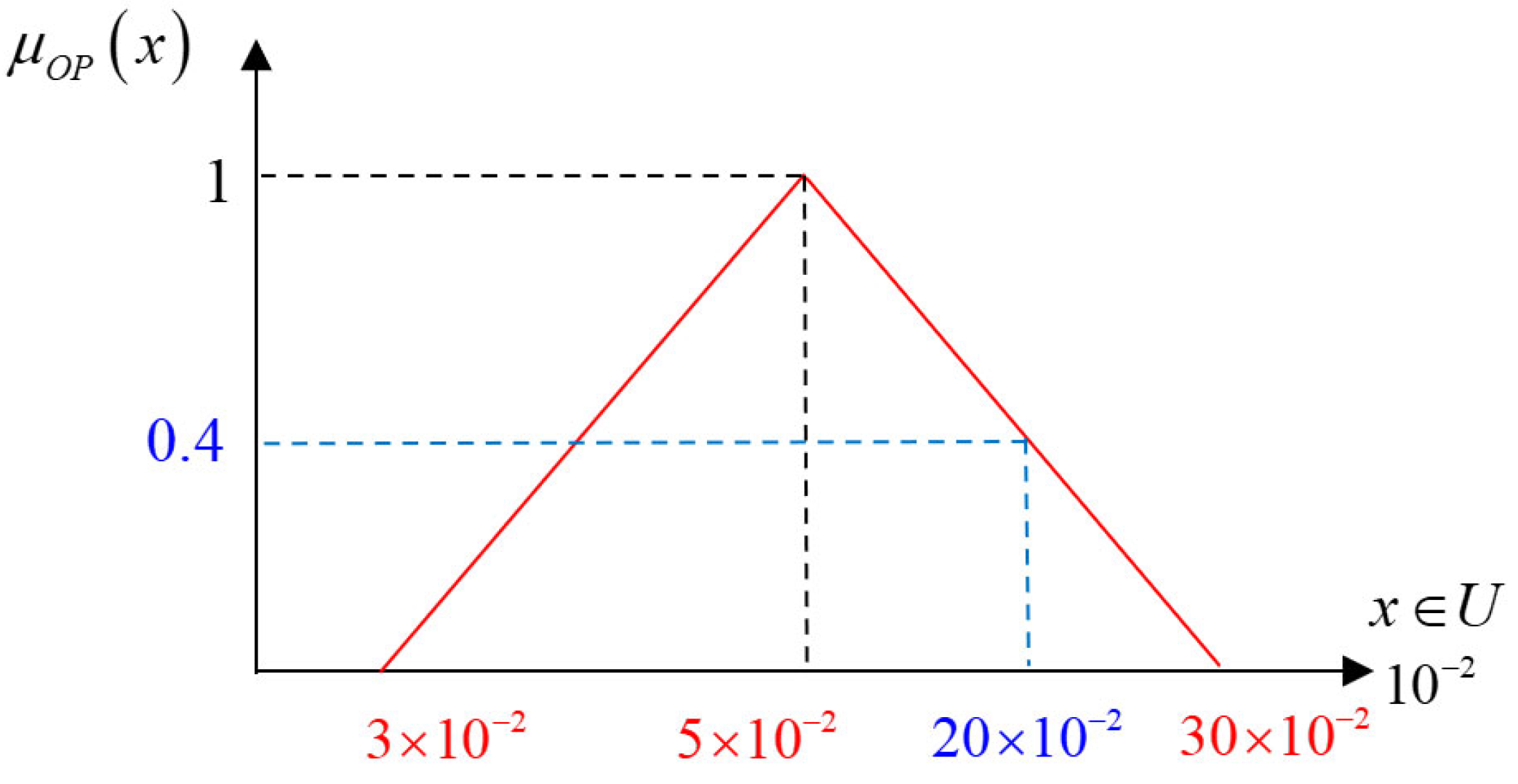
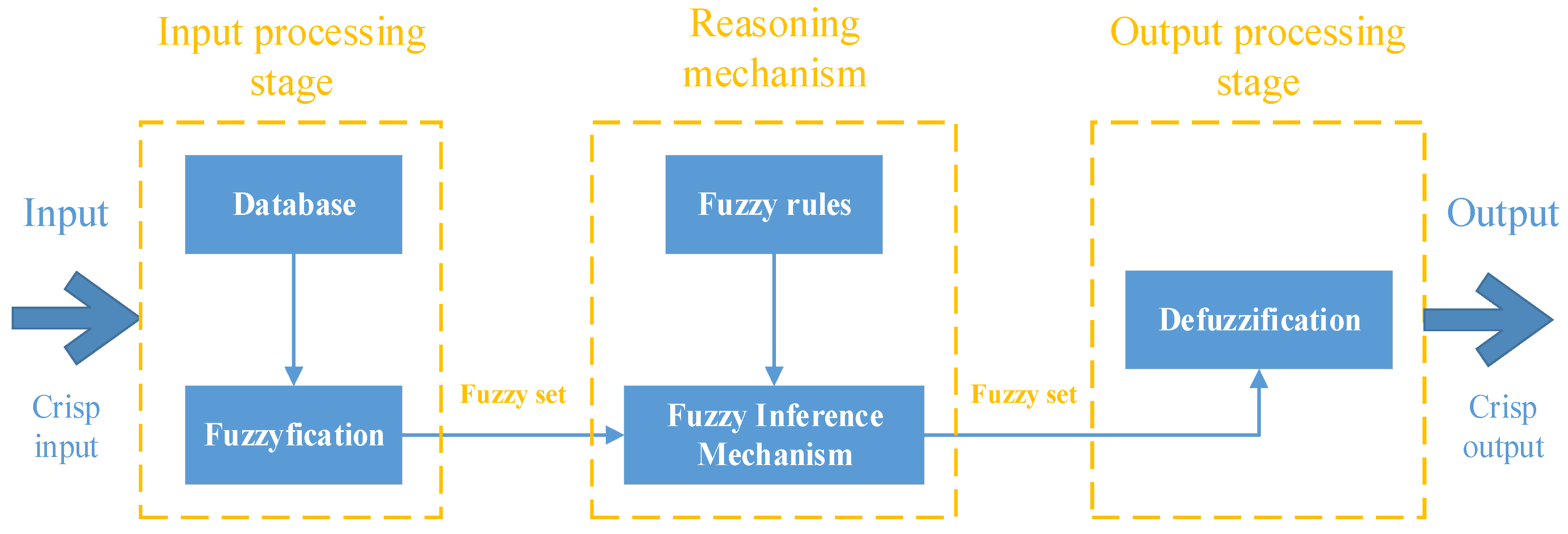
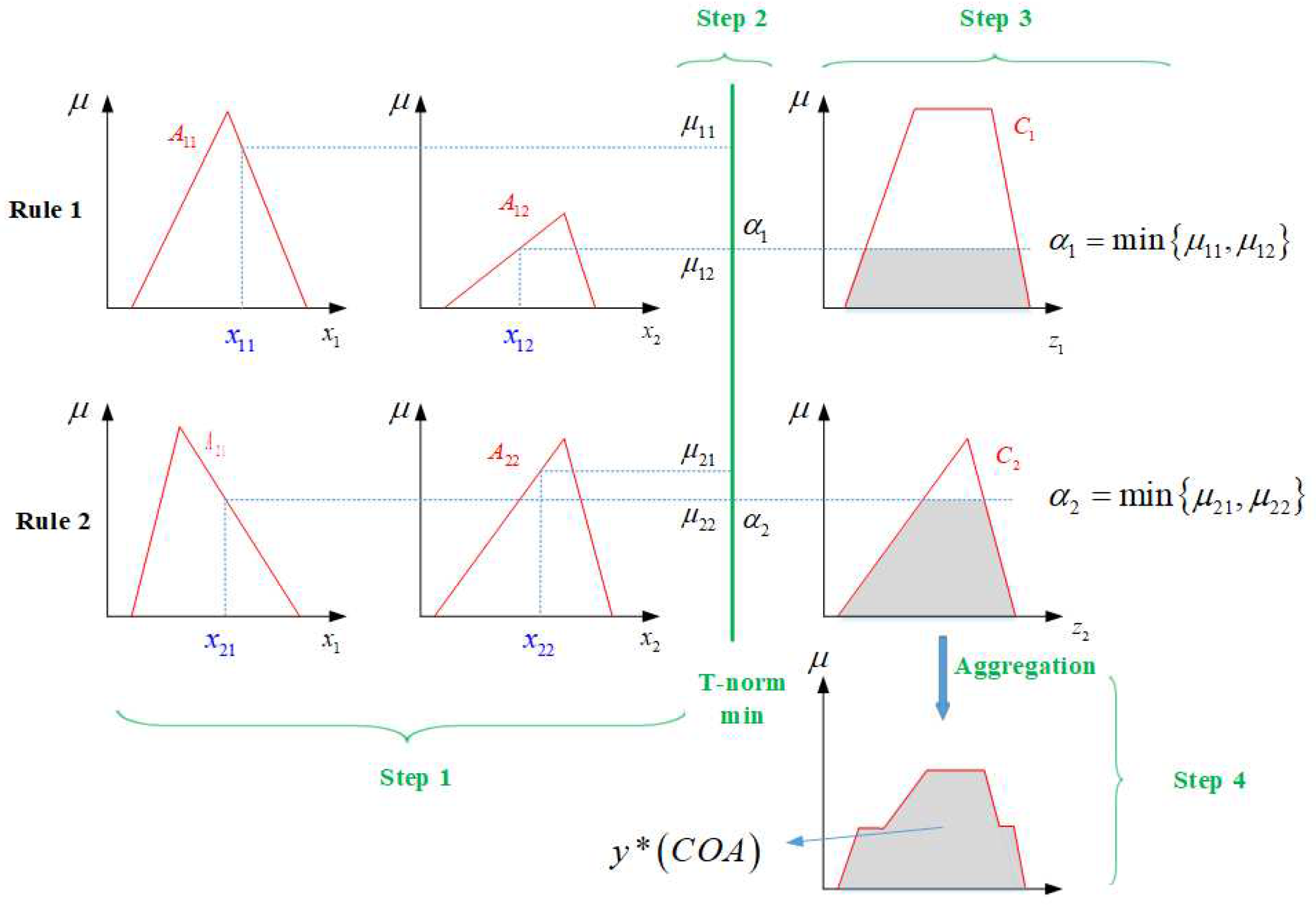
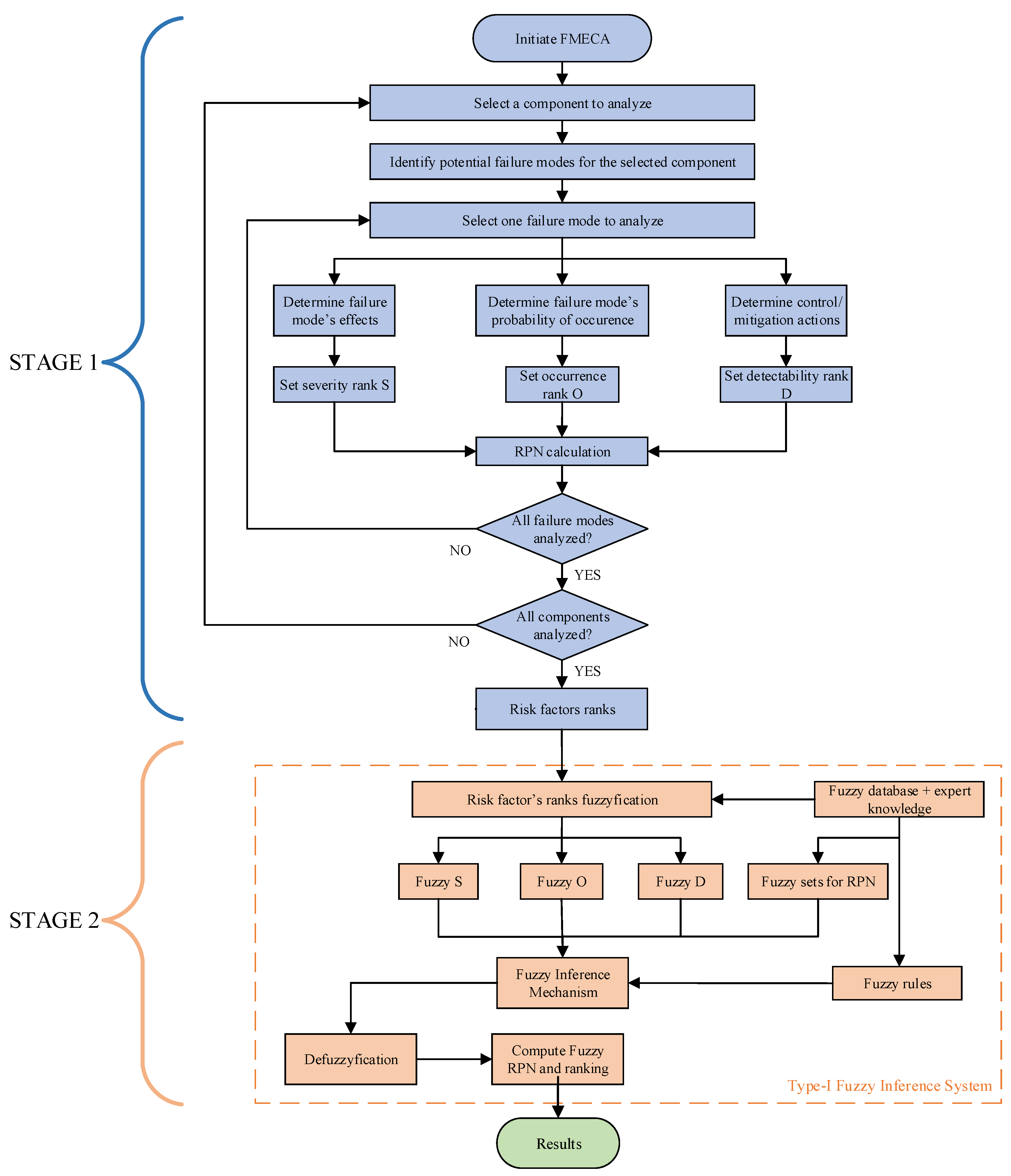
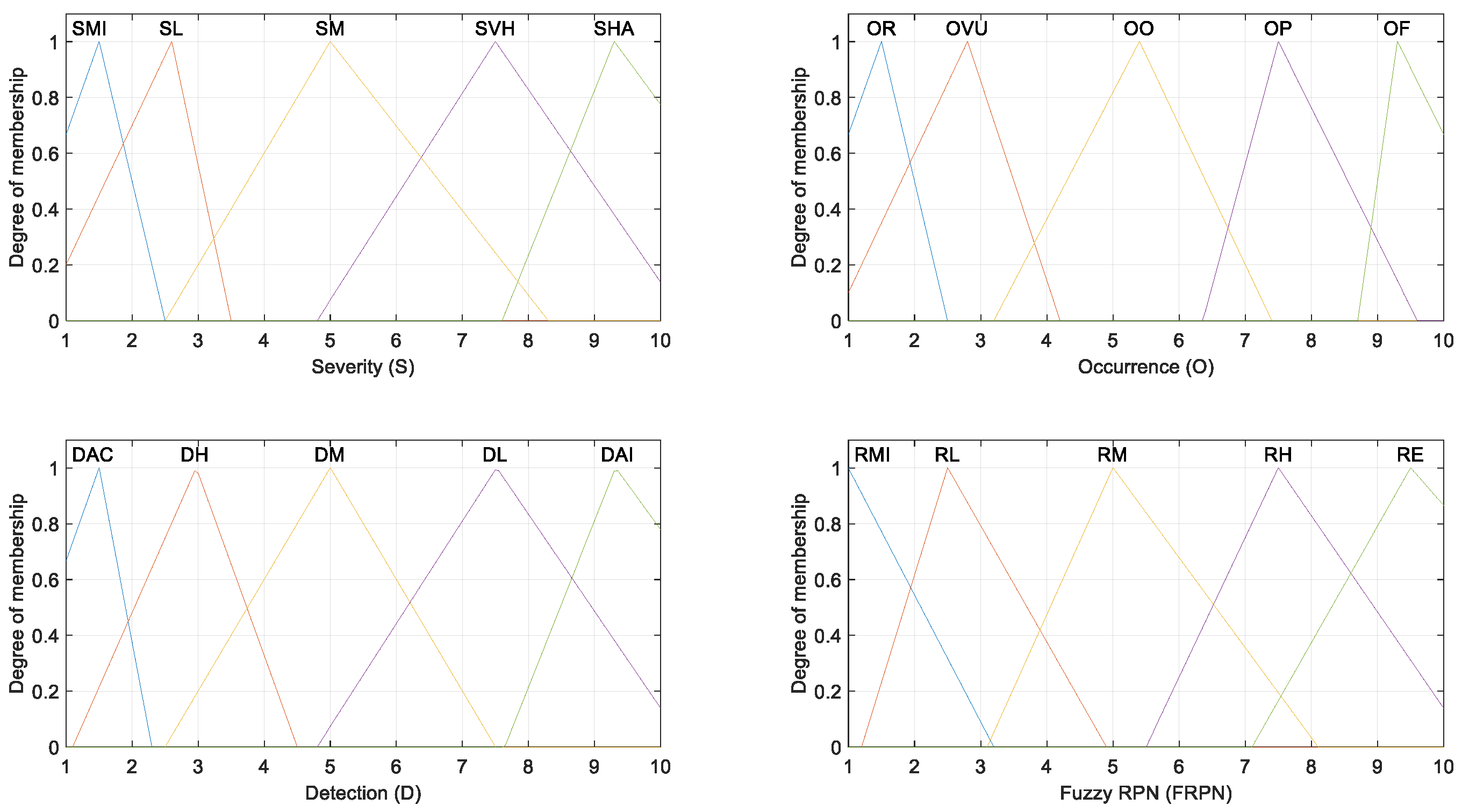
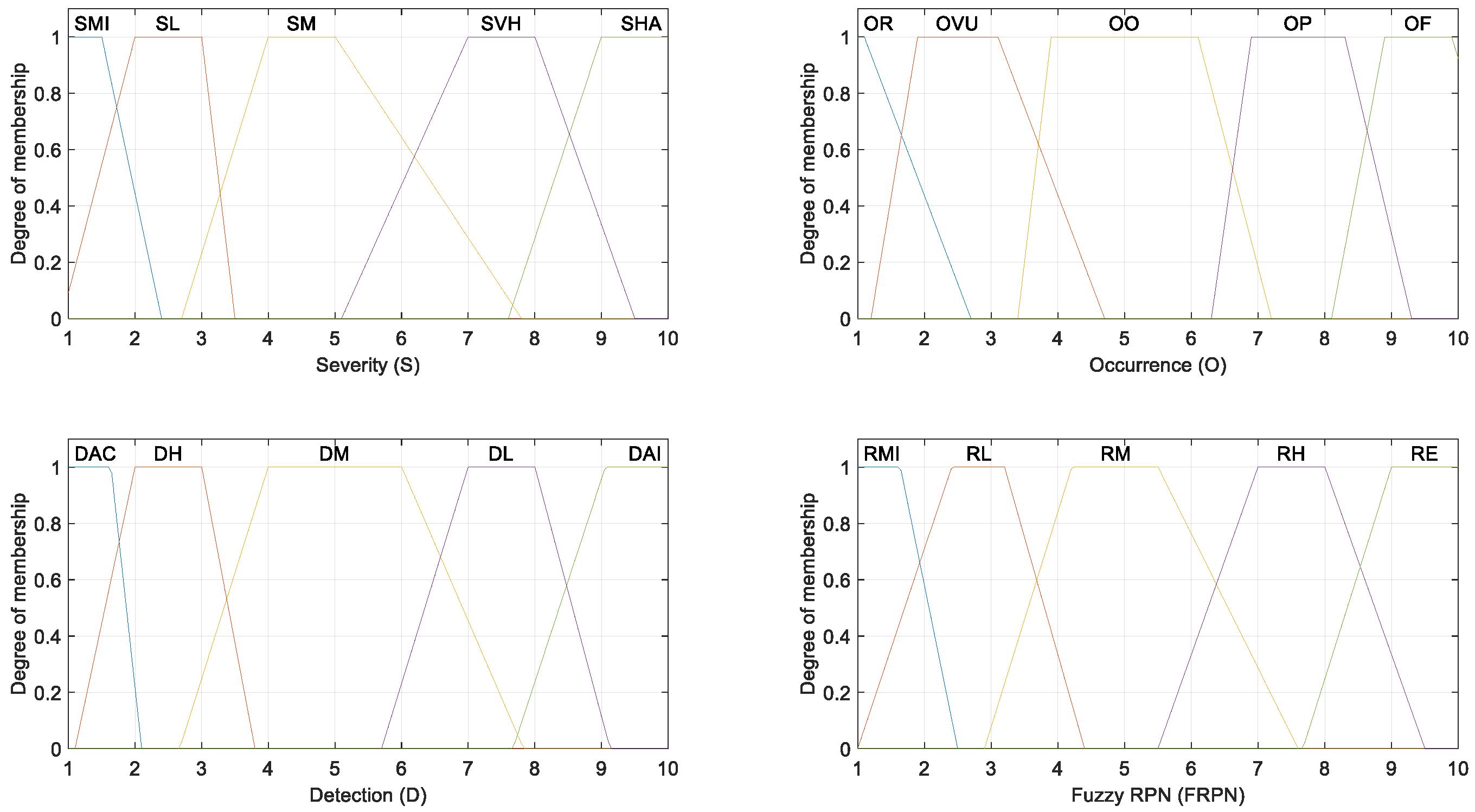
| Category | Severity | Occurrence | Detection | FuzzyRPN |
|---|---|---|---|---|
| 1 | tri(x; 0,1.5,2.5) | tri(x; 0,1.5,2.5) | tri(x;0,1.5,2.3) | tri(x; 0.4,1,3.2) |
| 2,3 | tri(x; 0.6,2.6,3.5) | tri(x; 0.8,2.8,4.2) | tri(x;1.1,2.9,4.5) | tri(x; 1.2,2.5,4.9) |
| 4,5,6 | tri(x; 2.5,5.0,8.3) | tri(x; 3.2,5.4,7.4) | tri(x;2.5,5.0,7.5) | tri(x; 3.1,5.0,8.1) |
| 7,8 | tri(x;4.8,7.5,10.4) | tri(x; 6.4,7.5,9.6) | tri(x;4.8,7.5,10.4) | tri(x; 5.5,7.5,10.4) |
| 9,10 | tri(x;7.6,9.5,12.4) | tri(x; 8.7,9.3,11.4) | tri(x;7.6,9.3,12.4) | tri(x; 7.1,9.5,13.2) |
| Category | Severity | Occurrence | Detection | FuzzyRPN |
|---|---|---|---|---|
| 1 | trap(x; 0.1,0.6,1.5,2.4) | trap(x; 1.0,1.0,1.1,2.7) | trap(x; 1.0,1.0,1.6,2.1) | trap(x; 1.0,1.0,1.6, 2.5) |
| 2,3 | trap(x;0.9,2.0,3.0,3.5) | trap(x; 1.2,1.9,3.1,4.7) | trap(x; 1.1,2.0,3.0,3.8) | trap(x; 1.0,2.4,3.2,4.1) |
| 4,5,6 | trap(x;2.7,4.0,5.0,7.8) | trap(x; 3.4,3.9,6.1,7.2) | trap(x; 2.6,4.0,6.0,7.8) | trap(x;2.9,4.2,5.5,7.6) |
| 7,8 | trap(x;5.1,7.0,8.0,9.5) | trap(x; 6.3,6.9,8.3,9.3) | trap(x; 5.7,7.0,8.0,9.1) | trap(x;5.5,7.0,8.0,9.5) |
| 9,10 | trap(x;7.6,9.0,10.0,12.2) | trap(x; 8.1,8.9,9.9,11.2) | trap(x; 7.6,9.0,10,10) | trap(x;7.67,9.06,10,10) |
| Failure Mode |
Equipment | Failure Mode(s) | S | O | D | RPN | Rank |
|---|---|---|---|---|---|---|---|
| FM1 | Busbar | Loos of structural integrity | 7 | 5 | 9 | 315 | 9 |
| FM2 | Bus bar | Loss of structural integrity | 7 | 6 | 9 | 378 | 3 |
| FM3 | Busbar | Loos of structural integrity | 7 | 5 | 9 | 315 | 10 |
| FM4 | Bus bar | Loss of electrical continuity | 8 | 4 | 10 | 320 | 6 |
| FM5 | Bus bar | Electrical disturbances | 8 | 4 | 10 | 320 | 7 |
| FM6 | Busbar | Electrical disturbances | 8 | 4 | 8 | 256 | 17 |
| FM7 | Cable | Cable integrity defect | 8 | 7 | 5 | 280 | 15 |
| FM8 | Cable | Electrical operation failure | 6 | 6 | 10 | 360 | 4 |
| FM9 | CB | Insulation failure | 6 | 5 | 7 | 210 | 26 |
| FM10 | CB | Wrong operation | 7 | 6 | 4 | 168 | 37 |
| FM11 | CB | Bushing breakdown | 6 | 5 | 10 | 300 | 11 |
| FM12 | CB | Bushing terminal hot spot | 6 | 4 | 8 | 192 | 29 |
| FM13 | CB | CB contacts degradation | 6 | 5 | 9 | 270 | 16 |
| FM14 | Transformer | Bushing breakdown | 6 | 4 | 10 | 240 | 22 |
| FM15 | Transformer | Bushing terminal hot spot | 6 | 4 | 7 | 168 | 39 |
| FM16 | Transformer | Magnetic-core delamination | 6 | 4 | 7 | 168 | 38 |
| FM17 | Transformer | Winding overheating | 7 | 6 | 7 | 294 | 14 |
| FM18 | Transformer | Tap changer contacts degradation | 6 | 3 | 9 | 162 | 40 |
| FM19 | Transformer | Tank rupture | 8 | 3 | 9 | 216 | 23 |
| FM20 | Transformer | Winding isolation degradation or breakdown | 6 | 4 | 10 | 240 | 21 |
| FM21 | Transformer | Distortion, loosening, or winding displacement | 7 | 5 | 9 | 315 | 8 |
| FM22 | Transformer | Transformer explosion | 9 | 5 | 10 | 450 | 1 |
| FM23 | Transformer | Cooling system failure | 8 | 3 | 7 | 168 | 36 |
| FM24 | HMI | Operational failure | 5 | 5 | 10 | 250 | 19 |
| FM25 | HMI | Security failure | 9 | 2 | 10 | 180 | 33 |
| FM26 | SW | Performance decreased | 6 | 7 | 6 | 252 | 18 |
| FM27 | SW | Operational failure (SW blackout) | 6 | 6 | 10 | 360 | 5 |
| FM28 | SW | Operational failure (SW blackout) | 6 | 5 | 10 | 300 | 13 |
| FM29 | SW | Network/Cyber storm | 6 | 4 | 7 | 168 | 35 |
| FM30 | SW | Power outage | 6 | 3 | 10 | 180 | 34 |
| FM31 | SV | Data errors | 6 | 5 | 10 | 300 | 12 |
| FM32 | SV | Power outages | 7 | 3 | 10 | 210 | 25 |
| FM33 | SV | Security failure | 10 | 2 | 10 | 200 | 28 |
| FM34 | IED | Communication failure | 6 | 5 | 8 | 240 | 20 |
| FM35 | IED | Communication failure | 6 | 4 | 8 | 192 | 30 |
| FM36 | IED | Communication Failure | 6 | 5 | 7 | 210 | 27 |
| FM37 | IED | Monitoring failure | 6 | 5 | 6 | 180 | 32 |
| FM38 | IED | Control failure | 8 | 7 | 7 | 392 | 2 |
| FM39 | IED | Power outages | 7 | 3 | 10 | 210 | 24 |
| FM40 | IED | Security failure | 9 | 3 | 7 | 189 | 31 |
| FM41 | Optical fiber | Fracture | 4 | 3 | 10 | 120 | 41 |
| FM42 | Optical fiber | Humidity induced | 4 | 3 | 10 | 120 | 42 |
| Configuration | MF Severity |
MF Occurrence |
MF Detection |
MF Fuzzy RPN |
|---|---|---|---|---|
| FIS-01 | Trapezoid | Triangular | Triangular | Trapezoid |
| FIS-02 | Triangular | Triangular | Triangular | Triangular |
| FIS-03 | Trapezoid | Trapezoid | Trapezoid | Trapezoid |
| Failure Mode |
Classic RPN | Classic Rank |
FIS01 FRPN | FIS01 Rank |
FIS02 FRPN | FIS02 Rank |
FIS02 FRPN | FIS03 Rank |
|---|---|---|---|---|---|---|---|---|
| FM1 | 315 | 9 | 8.216 | 4 | 8.258 | 2 | 8.524 | 2 |
| FM2 | 378 | 3 | 8.138 | 7 | 8.189 | 5 | 8.524 | 3 |
| FM3 | 315 | 10 | 8.216 | 5 | 8.257 | 3 | 8.524 | 4 |
| FM4 | 320 | 6 | 8.325 | 2 | 7.678 | 14 | 8.352 | 6 |
| FM5 | 320 | 7 | 8.325 | 3 | 7.678 | 15 | 8.352 | 7 |
| FM6 | 256 | 17 | 7.760 | 15 | 7.412 | 21 | 7.673 | 19 |
| FM7 | 280 | 15 | 7.556 | 19 | 7.470 | 20 | 7.501 | 23 |
| FM8 | 360 | 4 | 7.872 | 9 | 7.922 | 6 | 7.872 | 10 |
| FM9 | 210 | 26 | 6.831 | 34 | 7.205 | 33 | 6.378 | 37 |
| FM10 | 168 | 37 | 5.819 | 42 | 6.053 | 42 | 6.784 | 31 |
| FM11 | 300 | 11 | 7.872 | 10 | 7.922 | 7 | 7.872 | 11 |
| FM12 | 192 | 29 | 7.041 | 28 | 7.211 | 30 | 6.600 | 34 |
| FM13 | 270 | 16 | 7.872 | 11 | 7.922 | 8 | 7.872 | 12 |
| FM14 | 240 | 22 | 7.226 | 22 | 7.319 | 27 | 7.872 | 13 |
| FM15 | 168 | 39 | 5.974 | 39 | 6.401 | 39 | 5.518 | 40 |
| FM16 | 168 | 38 | 5.974 | 40 | 6.401 | 40 | 5.518 | 41 |
| FM17 | 294 | 14 | 6.860 | 33 | 7.206 | 32 | 6.784 | 32 |
| FM18 | 162 | 40 | 6.329 | 37 | 6.749 | 37 | 7.150 | 29 |
| FM19 | 216 | 23 | 7.688 | 17 | 7.515 | 18 | 7.673 | 20 |
| FM20 | 240 | 21 | 7.226 | 23 | 7.319 | 28 | 7.872 | 14 |
| FM21 | 315 | 8 | 8.216 | 6 | 8.257 | 4 | 8.524 | 5 |
| FM22 | 450 | 1 | 8.679 | 1 | 8.650 | 1 | 9.147 | 1 |
| FM23 | 168 | 36 | 6.906 | 31 | 6.934 | 36 | 6.545 | 36 |
| FM24 | 250 | 19 | 7.500 | 21 | 7.791 | 13 | 7.501 | 24 |
| FM25 | 180 | 33 | 7.529 | 20 | 7.619 | 16 | 8.352 | 8 |
| FM26 | 252 | 18 | 6.779 | 36 | 7.158 | 35 | 6.879 | 30 |
| FM27 | 360 | 5 | 7.872 | 12 | 7.922 | 9 | 7.872 | 15 |
| FM28 | 300 | 13 | 7.872 | 13 | 7.922 | 10 | 7.872 | 16 |
| FM29 | 168 | 35 | 5.974 | 41 | 6.401 | 41 | 5.518 | 42 |
| FM30 | 180 | 34 | 7.001 | 30 | 7.358 | 24 | 7.501 | 22 |
| FM31 | 300 | 12 | 7.872 | 14 | 7.922 | 11 | 7.872 | 17 |
| FM32 | 210 | 25 | 7.049 | 24 | 7.367 | 22 | 7.501 | 25 |
| FM33 | 200 | 28 | 8.048 | 8 | 7.619 | 17 | 8.352 | 9 |
| FM34 | 240 | 20 | 7.675 | 18 | 7.816 | 12 | 7.716 | 18 |
| FM35 | 192 | 30 | 7.041 | 29 | 7.211 | 31 | 6.600 | 35 |
| FM36 | 210 | 27 | 6.831 | 35 | 7.205 | 34 | 6.378 | 38 |
| FM37 | 180 | 32 | 6.047 | 38 | 6.459 | 38 | 6.012 | 39 |
| FM38 | 392 | 2 | 7.736 | 16 | 7.491 | 19 | 7.673 | 21 |
| FM39 | 210 | 24 | 7.049 | 25 | 7.367 | 23 | 7.501 | 26 |
| FM40 | 189 | 31 | 6.906 | 32 | 7.226 | 29 | 6.703 | 33 |
| FM41 | 120 | 41 | 7.049 | 26 | 7.337 | 25 | 7.501 | 27 |
| FM42 | 120 | 42 | 7.049 | 27 | 7.337 | 26 | 7.501 | 28 |
| Id | Equipment | Failure mode | Failure causes | Failure effects | S | O | D | FMECA Rank |
FIS01 Rank |
|---|---|---|---|---|---|---|---|---|---|
| FM22 | Transformer | Transformer explosion | Internal short circuit | Serious damage in the substation; personnel injuries or death | 9 | 5 | 10 | 1 | 1 |
| FM38 | IED | Control failure | Defective data processing (software error) | Inability to control power system operation | 8 | 7 | 7 | 2 | 16 |
| FM02 | Bus bar | Loss of structural integrity | Break of the support insulators | Bus bar break; no electrical connection | 7 | 6 | 9 | 3 | 7 |
| FM08 | Cable | Electrical operation failure | Short circuits transients | Excessive heat (saturation) | 6 | 6 | 10 | 4 | 9 |
| FM27 | SW | Operational failure (SW blackout) | SW is locked up | Incorrect SW function or SW malfunction | 6 | 6 | 10 | 5 | 12 |
| FM04 | Bus bar | Loss of electrical continuity | Arc flash | Degradation of the physical structure | 8 | 4 | 10 | 6 | 2 |
| FM05 | Bus bar | Electrical disturbances | Short circuits between bus bars | Short circuits | 8 | 4 | 10 | 7 | 3 |
| FM21 | Transformer | Distortion, loosening, or displacement of the winding | Short circuits | Internal short circuits; transformer damage | 7 | 5 | 9 | 8 | 6 |
| FM01 | Busbar | Loos of structural integrity | Fracture of the cooper bar | Bus bar break; no electrical connection | 7 | 5 | 9 | 9 | 4 |
| FM03 | Busbar | Loos of structural integrity | Cracking of connection welds | Bus bar break; no electrical connection | 7 | 5 | 9 | 10 | 5 |
Disclaimer/Publisher’s Note: The statements, opinions and data contained in all publications are solely those of the individual author(s) and contributor(s) and not of MDPI and/or the editor(s). MDPI and/or the editor(s) disclaim responsibility for any injury to people or property resulting from any ideas, methods, instructions or products referred to in the content. |
© 2023 by the authors. Licensee MDPI, Basel, Switzerland. This article is an open access article distributed under the terms and conditions of the Creative Commons Attribution (CC BY) license (http://creativecommons.org/licenses/by/4.0/).





